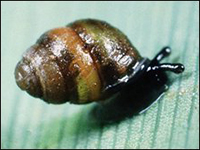A rare species of snail has been discovered at a County Down bog.
The Desmoulin’s whorl snail, known scientifically as Vertigo moulinsiana, was found by a team of specialists who were carrying out field surveys at the Lecale Fens Special Area of Conservation (SAC) site just outside of Downpatrick, as part of an EU-funded environment project known as the Collaborative Action for the Natura Network (CANN) project.
The CANN project is a €9.4 million cross-border environmental project, led by Newry, Mourne and Down District Council, that is working to protect endangered species and restore natural habitats found within Northern Ireland, the Border Region of Ireland and Western Scotland. The project is funded by the EU’s INTERREG VA Programme, managed by the Special EU Programmes Body.

Applauding the find Newry Mourne and Down District Council Chairman, Councillor Mark Murnin said: “Newry, Mourne and Down District Council is delighted that such a rare and ecologically important species has been discovered at one of the CANN project sites, especially at a site located within the district.”
The Desmoulin’s whorl snail has been in decline in recent years, caused by wetland drainage and changes in land management practices, and whilst they can be found in a number of European countries including the UK and Ireland, they are not common. This finding is the first ever recorded in Northern Ireland.
The discovery of the snail at the County Down location is especially notable given the size of the Desmoulin’s Whorl snail; typically less than 3mm in size, these molluscs are smaller than a new-born baby’s fingernail.
Explaining the importance of the find, Dr Trish Fox from Ulster Wildlife said: “To say this find has rocked the conservation world in Northern Ireland would be an understatement. This is a first for Northern Ireland. The Desmoulin’s whorl snail is such a significant species that its presence has previously halted infrastructure construction in both the UK and Ireland. There has already been a major survey for the species regionally so for it to be found now is quite amazing.”
Match-funding for the CANN project has been provided by the Department of Agriculture, Environment and Rural Affairs in Northern Ireland, the Department of Housing, Planning, Community and Local Government in Ireland along with Scottish Natural Heritage.
























